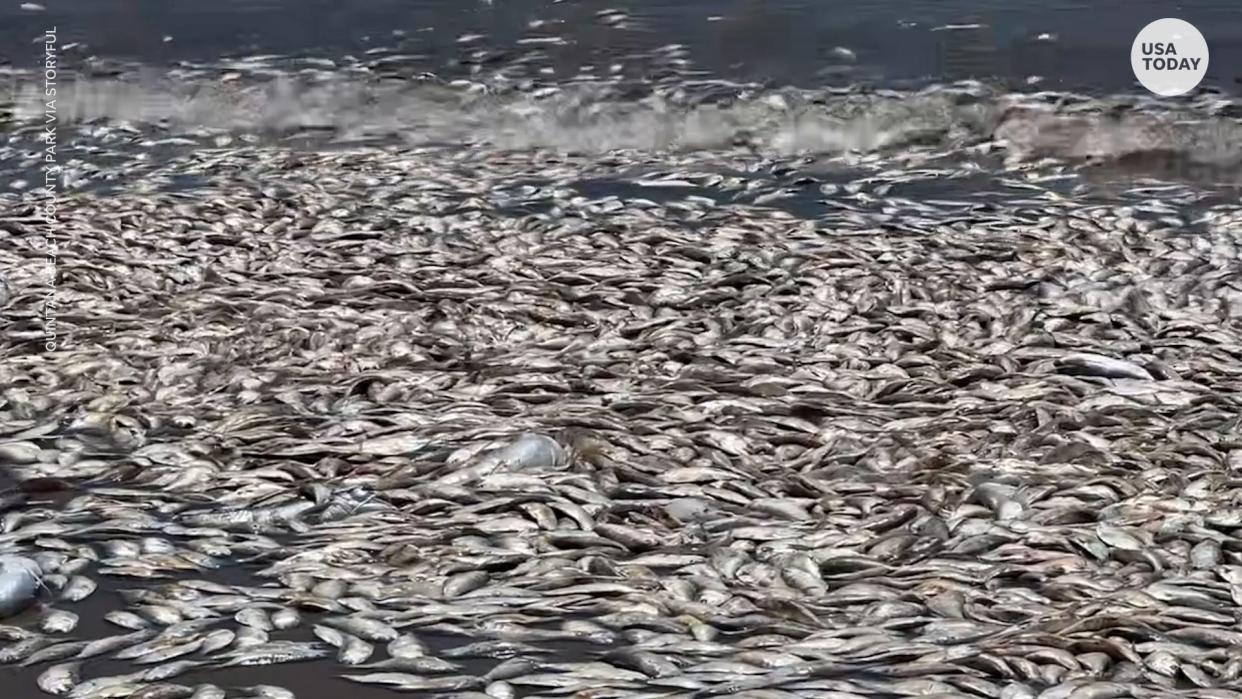Why so many dead fish in a local lake area? Science solves the mystery

Until just recently, it has been one hot and very dry summer.
Excessive heat and excessive drought put a big stress on the plants and animals in our ecosystem. It might surprise you to learn that fish experience the greatest threat in these hot and dry conditions. Really? A fish that is in water suffers when it is too dry and hot outside?
It does, and we have an unfortunate but common real-life example of this right here in Columbia.
Walkers and bikers enjoying Columbia’s fantastic Twin Lakes park the first week of August were treated to an off odor around the lake. The odor was coming from thousands of dead fish floating at the surface.
There were so many dead fish that it looked like the lake was outlined in a border of white rocks. Those were not rocks. They were dead fish.
Due to the lack of rain this summer, the lake level was several feet below normal and the water was quite warm. However, the irony is that this occurred on the week where we finally saw significant rains. The lake was low, but it wasn’t as low as it was just a week earlier.
The fish kill occurred right as it seemed that relief was coming. What happened?
Oxygen breathers
Most people know this, but it is worth saying: Fish live underwater but most certainly breathe oxygen.
Their gills extract the oxygen that is dissolved in the water. Just like us, they cannot live without a constant supply of oxygen. That is important to understand before we tackle the problem.
Summer oxygen depletion
Water maintains dissolved oxygen in one of two ways. First, whenever the surface of the water is disturbed by wind or rain, those ripples or raindrops mix atmospheric oxygen into the water.
The problem this summer is we were far below normal when it came to rain and storms. The lack of storms did not churn the water up as it usually does and the oxygen mixing did not occur often.
Second, oxygen is created in ponds by algae and aquatic plants during the day through the process of photosynthesis. This is helpful to fish. What people often do not know is that, at night, the plants take some of that oxygen back in.
Therefore, lake oxygen levels tend to be lowest in the early morning just before the sun comes up and starts the photosynthesis process again.
Another factor is that warm water holds less oxygen than cooler water. Our lake waters are very warm this year and therefore hold below-average amounts of oxygen.
In another ironic twist, fish become more active in warm water but this means they also require more oxygen — at a time when the levels are the lower.
The perfect storm — literally
The entire summer has set the stage for very low water oxygen levels. Consider these factors:
A very hot summer, which made the water hot and a poor holder of oxygen.
A very dry summer, which offered few chances to churn the water with wind and rain.
A drought that lowered the water levels. Shallow waters warm quicker than deeper waters.
And then the ultimate irony: a big week of storms and clouds. While every fish kill could have several factors, the relief we have been hoping for might have been the final straw for them.
When it rained a lot all at once, an influx of water rushed into the shallow pond. This caused a sudden change in water chemistry and also temporarily diluted the little oxygen that remained in the pond.
To add to this, remember that pond plants give oxygen to the pond when the sun is out and take it from the water when it is dark. Scientists have measured that extended periods of clouds greatly decrease pond plant oxygen production. The week of this fish kill saw more clouds than sun.
While there is often a combination of factors that cause a massive fish kill like this, this particular fish kill was almost certainly caused by a very rough weather pattern, with the final straw being too much relief all at once.
However, you might find comfort in knowing this is all natural and the remaining fish ecosystem in the pond will likely be stronger due to the thinning out of any overpopulation as long as this does not happen too often.
Mike Szydlowski is a science teacher and zoo facilitator at Jefferson STEAM School.
TIME FOR A POP QUIZ
Lungs process oxygen for humans. How does this happen in fish?
How does new oxygen get into ponds?
At what time of day would the oxygen levels in a pond be the highest? Why?
Why do many fish kills happen during a hot and dry summer?
Why did this fish kill happen just as relief was coming?
LAST WEEK'S QUIZ ANSWERS
What is ice cream?
Ice cream consists of milk, fat, sugar and water.
What role does air play in ice cream?
Air makes the ice cream lighter and creamier. Without air, ice cream would just be a frozen block of cream.
Why is ice cream constantly churned or stirred while making it?
Churning prevents large ice crystals from forming in the mixture, which would make the ice cream crunchy. Only small ice crystals can form in a moving liquid and this makes the texture smoother.
Why does ice cream require so much sugar?
Our tongues have trouble processing the taste from cold foods. Therefore, cold foods require more flavors (in this case, sugar) than warm foods.
What is the difference between expensive and cheap ice cream?
The cheaper ice creams whip more air into the mixture and use less fat than the more expensive and tastier ice creams.
This article originally appeared on Columbia Daily Tribune: How science explains the mystery behind a large local fish kill

